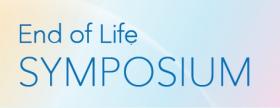
2019 End of Life Symposium Videos
This symposium was designed to educate healthcare professionals, hospices, long-term care facilities and hospitals in End of Life Care for patients with complex and terminal diseases and prepare them for providing care to patients when the focus of their treatment changes from curative to palliative care. The goal of palliative care is to focus on comfort and quality of life when curative treatments are no longer an option.
Caring for patients at the end of life, whether during anticipated or sudden death is a challenging experience for everyone involved in providing care to the patient. Education and discussions around the issues faced at the end of life are critical to fostering a comfort level with clinical staff, caregivers, patients, families and institutions. With the advances in multiple options at the end of life, from Comfort Care, Palliative Sedation and the End of Life Option Act, many healthcare providers are unprepared for conversations with patients regarding their options at the of end of life.
Target Audience
Physicians, physician assistants, nurses, social workers, hospice clinicians, spiritual care representatives , hospital administrators, hospice administrators and staff, long-term care and skilled nursing facilities administrators and staff.
Learning Objectives
- Engage with patients regarding their values, priorities and options at the end of life.
- Discuss the full range of end of life options with patients.
- Address and manage symptoms at the end of life.
- Discuss advance care planning and the role of hospice.
- Discuss the End of Life Option Act and resources for patients/providers.
- Identify resources to help provide support for the caregiver.
- Discuss prognostication in serious illness.
Additional Information
| Attachment | Size |
|---|---|
| 298.11 KB |
The original conference was planned and implemented in strict compliance with the accreditation requirements, standards, and policies of the ACCME. City of Hope takes responsibility for the content, quality and scientific integrity of this CME activity.
As an accredited CME provider City of Hope requires everyone who is in a position to control the content of an educational activity to disclose all relevant financial relationships with any commercial interest. The ACCME defines "relevant financial relationships" as financial relationships in any amount, occurring within the past 12 months, including financial relationships of a spouse that could create a conflict of interest. Any potential conflicts relative to the previous disclosure have been resolved.
Written disclosure of all such relevant commercial relationships will be provided in the activity handout and/or syllabus. Any potential conflicts relative to the previous disclosure have been resolved.
City of Hope further encourages faculty/ authors to identify investigational products or off-label uses of products regulated by the U.S. Food and Drug Administration, at first mention and where appropriate in the content.
The information and opinions presented in this activity do not constitute medical or legal advice. Health care providers must exercise their own professional judgment in their clinical practice, and when confronted with the issues discussed herein, should not substitute this curriculum for the advice of legal counsel or application of sound ethical principles.
Acknowledgement of Commercial Support: This educational activity was made possible, in part, through unrestricted educational grants of support. All grant supporters were acknowledged via signage, e-syllabus, and/or handouts.

 Facebook
Facebook X
X LinkedIn
LinkedIn Forward
Forward